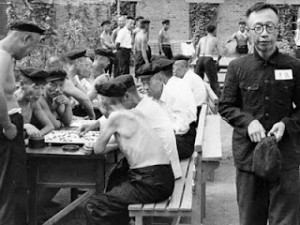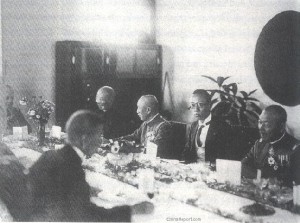From Mao-Tse Tung-er Deshe (In ‘Mao Tse-tung’s Country’ by Maulana Abdul Hamid Khan Bhashani), pp. 44-45
‘The veteran official then explained to us that the Communist Party would be generous with us and would give us every opportunity to examine and reform ourselves. The Party would not look too deeply into the past because there was nothing to be gained from that. He informed us that we would be sent to a war criminals camp in the south-eastern province of Fujien.
‘That was the day when it dawned on me that I would not be shot after all. My relief and gladness was such that I cannot hope to convey their extent. The water of gratitude came into my eyes. That was the day when for the first time in my life, I cried out of gratitude.
‘We went to the camp for war criminals. When I was a monarch no doubt there were hundreds of prisoners in my camps. I have no knowledge of how they were treated. I never saw a jail or a camp for prisoners. But I had a terrifying mental picture of these things. You could say that to a great extent this was like a picture of hell. When I saw a prisoners’ camp for the first (and possibly the last) time in my life it was as a prisoner. All the way from Mukden to Fujien I was quaking with fear and misgiving at the thought of what awaited me. In such a place what would become of the rest of my days! No blankets in the winter, a hard, cold stone floor for a bed, for food, such things that even the dogs of my palace had never touched – whether death would not be better than this unbearable life was a thought that often occurred to me.
‘On arriving in Fujien I saw that there was no connection between the Communist camp and my imaginings. The camp was not intended to punish people.

It was a centre where people could try to change their characters – you could say a place for people to heal. The treatment we met with in the camp was so humane and so respectful of our dignity that we were amazed yet again. …
‘In 1949 at Chairman Mao’s behest it was decided that prisoners who had undergone a genuine change and accepted the revolution would be set free. I had not imagined that I would be set free –

I was the plaything of the country’s enemies!
But when the list of those to be set free arrived I saw that my name was in first place.’

Mercy. not something we are trained to recognise in Maoism!
Thankyou for translating, bhai. Layli, you rock!